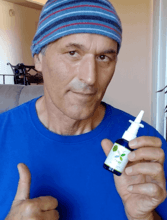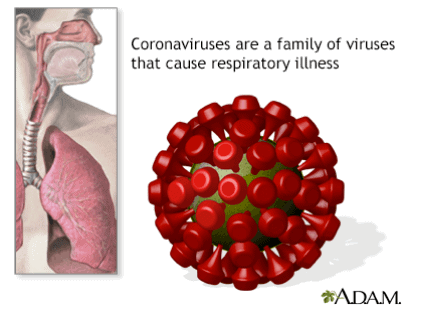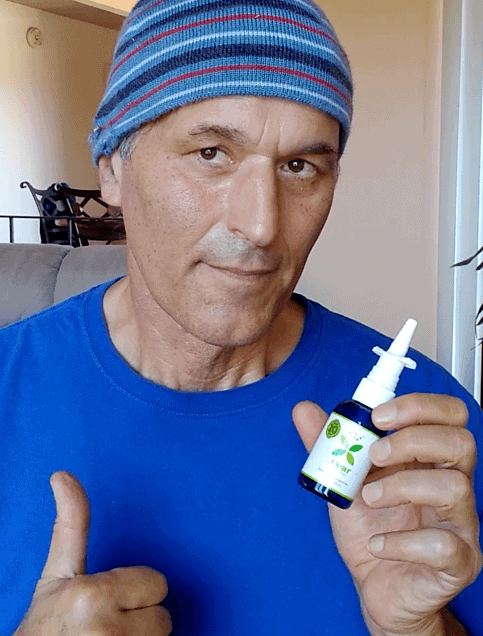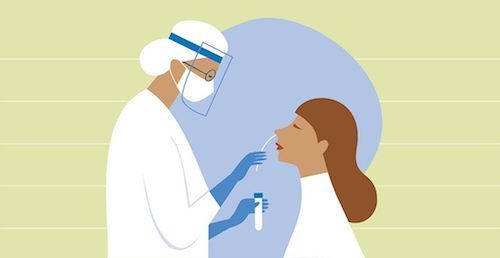Can An Inhaled Nasal Spray Kill Covid?

While the world scrambles to develop a vaccine for SARS-CoV-2, could a simple inhaled nasal spray do the job? Right now it may be the next best thing to a vaccine. In fact, scientists are now exploring if the nasal passage is the best place to deliver a vaccine. Learn what you can do now to protect yourself.
It may come as a surprise to you, but an inhaled nasal spray might wind up being the most effective preventative measure you can take right now to avoid getting infected with SARS-CoV-2, or as we often refer to it, and the disease it can create, Covid.
Back in March, I wrote that:
….a major preventive thing you can do for any viral respiratory illness is to irrigate your nasal passages with Xlear nasal spray at the end of every day, and after any exposure to crowds (work, school, playgroups, plane travel, etc.).
That particular nasal inhaled nasal spray, Xlear, was examined in three studies I know about, and now nasal vaccines for Covid are being studied. Let’s dig into these alternative methods of resisting infection, and see you should use a nasal spray in your arsenal of virus-prevention tools.
Can A Inhaled Nasal Spray Prevent Covid Infection?
 To answer that question, I’ll share a small part of my online video course called Covid Immunity. The sixth suggestion of Lesson 3, Avoid Infection, is to use a nasal spray inhaler:
To answer that question, I’ll share a small part of my online video course called Covid Immunity. The sixth suggestion of Lesson 3, Avoid Infection, is to use a nasal spray inhaler:
Using a spray inhaler departs from the five other basic strategies we covered, because using an inhaler will not prevent contact with the virus. What it can do, however, is to prevent the virus from infecting you and getting you sick.
A review of three studies about COVID-19 underscored the importance of clearing your nasal cavity of the virus before it can do much damage. By using an nasal spray inhaler, specifically a brand called Xlear, the researchers found that the virus was reduced to an undetectable amount in 15 minutes. [1]
This study was replicated at Geneva University. And another study done by researchers at the University of North Carolina, Chapel Hill supports the claim that cleansing the virus from the nasal cavity before it firmly establishes itself before moving on to the respiratory system is an effective way to block infection or lessen the severity of symptoms.
It appears that the major reason a nasal spray can be effective in clearing a virus from the nasal cavity is due to humidity.
A study published in 2019 looked at the role of humidity in our respiratory tract can confer immunity to influenza virus. The researchers saw that a 40 to 60% relative humidity helped remove the virus from the respiratory tract. [2]
So, it appears that keeping the nasal cavity humid is a good thing to do.
When I’m going to be out among people indoors I use Xlear, the product tested in the Utah State University nasal spray study. Every hour or so, I give myself a nasal blast. Again, the objective is to make the nasal passages more humid and thereby help clear the virus.
Studies indicate that the effectiveness of putting the “medicine” where the infection most often occurs — in your nasal passage — makes enough sense that pharmaceutical companies and various research organizations are seeking to make an inhaled nasal spray vaccine.
I should point out that there’s nothing magical about Xlear; it just happened to be the inhaled nasal spray that has been studied. It contains purified water, saline solution, grapefruit extract (which contain antimicrobials ) and xylitol (a sugar substitute, reportedly, with some antiviral and antibacterial effects). But, apparently, what’s most effective about Xlear and other inhaled nasal sprays is the humidity they confer to the nasal passage, as I’ll address below.
A Nasal Spray Vaccine for Covid
The majority of vaccines being developed and tested for Covid are designed to be injected into the arm, per usual. However, researchers are examining if you could get better protection from inoculations that fight the virus, SARS-CoV-2, where it makes its first attack — the nose and mouth. Scientists are hoping to generate superior immune responses with inhaled vaccines that directly target the airway cells the virus invades.
Sprayed and inhaled immunizations under development in the U.S., Britain and Hong Kong may be able to help us escape the restrictions that have wounded economies and everyday life. The idea is to prevent the virus from growing in the nose, a point from which it can spread to the rest of the body, and to other people.
“Local immunity matters,” said Dr. Frances Lund, a University of Alabama at Birmingham immunologist working with biotech Altimmune Inc. on an early-stage nasal inoculation. “The vaccines that can be delivered to generate that will have some advantages over vaccines that are delivered systemically”, she says.
Dr. Lund explained that there are benefits derived from a local response related to the infection site relative to a systemic response: “The majority of vaccines — in fact, all of the ones that are currently in clinical trials — are delivered via the muscle.”
A vaccine injection into muscle, typically into a deltoid (shoulder) muscle, typically provides the strongest immune response, but says Lund, “You will get a systemic response… not a local response with that”.
By systemic response, Dr. Lund refers to generating antibodies that circulate systemically through the blood to all parts of our bodies, but for a respiratory virus like a coronavirus, the infection typically starts in the nose or throat, and an infection can take hold there before the systemic immunity kicks in.
The injected vaccine might protect people from getting very ill, but people still might have virus in their nose that could spread to others. In contrast, getting a vaccine directly into the nose offers another kind of immunity that occurs primarily in the cells that line the nose and throat.
Says Dr Lund:
“You still get systemic immunity if you deliver it via the intranasal route, so that doesn’t go away, and you add a level of immunity that you don’t get with an intramuscular vaccine. And that immunity is local.”
Inhaled vaccine makers, as well as nasal inhale sprays like Xlear, are counting on some unique features of the lungs, nose and throat, which are lined with mucosa. This tissue contains high levels of immune proteins, called IgA, that give better protection against respiratory viruses:
- In the case of a nasal vaccine, activating these immune weapons, they theorize, can protect areas deeper in the lungs where the SARS-CoV-2 does the most damage. They also may improve vaccines’ chances of blocking transmission.
- In the case of nasal inhale sprays, the increased humidity in the nasal passage reduces the viral load. If the viral load is small enough, an otherwise compromised immune system has a better chance of reducing its impact.
Altimmune, based in Gaithersburg, Maryland, plans to enter human testing with a nasal vaccine in the fourth quarter after positive studies in mice. Scientists at the University of Oxford (where a promising vaccine shot under development at AstraZeneca Plc was designed), and Imperial College London are also planning studies of slightly different inhaled vaccines.
The experimental immunizations in Britain would be delivered through a mouthpiece in an aerosol, similar to some asthma therapies. Imperial researchers point to evidence that delivering influenza vaccines via a nasal spray can protect people against illness and help reduce transmission; they’re keen to explore if that’s also the case for SARS-CoV-2. AstraZeneca makes the FluMist nasal spray vaccine.
Researchers in Hong Kong are aiming for an intranasal vaccine that would simultaneously offer influenza and Covid-19 protection. The first phase of human tests will start next month, said Yuen Kwok-Yung, chair of infectious diseases in the University of Hong Kong’s department of microbiology.
Suffice to day, there’s a widespread push to develop a vaccine delivered via nose or mouth.
Your Takeaway
Governments all over the world have invested billions of dollars in many research labs and pharmaceutical companies to incentivize an unmatched short time horizon to develop a Covid vaccine.
Most of these efforts are focused on an injected form of vaccine, but there’s a compelling case, and much work being done, on a nasal inhaled spray containing the vaccine that can protect against infection where it first occurs the most — in your nose.
None of these vaccines will likely be approved in 2020 and accepted by many of us as safe; also, it will take months for any vaccine to be widely distributed. In the meantime, I suggest you act to protect yourself with what’s available now.
Protection against Covid that’s available now includes a inhaled nasal spray, and a detailed list of protective measures I’ve outlined in the following posts:
- Your Aging Immune System and COVID-19
- How To Boost Your Immune System To Fight Viruses Like Coronavirus (Covid-19)
- Let Nature Strengthen Your Immune System
- Forget Herd Immunity — Make Your Immune System Smart!
Last Updated on July 7, 2023 by Joe Garma




